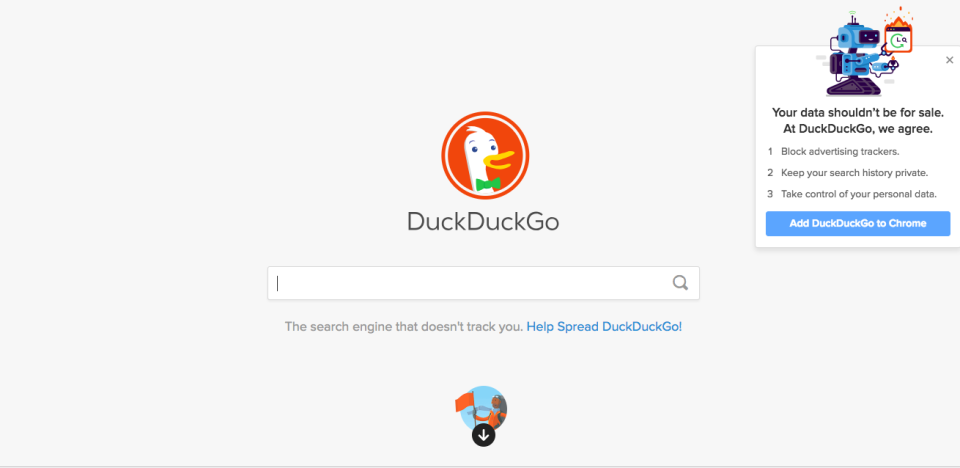What it's like to use a search engine that's more private than Google

A few weeks ago, I did something that might seem vaguely unpatriotic: I set the default search in my laptop’s browser to something besides Google.
This wasn’t my first extended usage of DuckDuckGo, a privacy-optimized alternative to the omnipresent Alphabet, Inc., (GOOG, GOOGL) search engine that long ago became a verb. DuckDuck Go prides itself on not tracking users and started getting attention after Edward Snowden’s revelations of widespread government internet surveillance. Now, that non-Google search sits at the center of my browsing experience on one of the computers I use most often.
Should you follow my example? Maybe not! DuckDuckGo works fine as an everyday search tool, but it sometimes requires an extra click and doesn’t help much with digging up pages from the past. But you should at least consider whether you must use the same search tool as almost everybody else all the time.
It’s fine, really
Google’s ubiquity makes it easy to forget how often search is, or at least ought to be, a commodity product: You either want a specific page or basic info about a topic, and any decent search site should surface them equally well. I’ve realized that each time I’ve typed a search into DuckDuckGo, then plugged the same query into Google.

When I need to locate one page, DuckDuckGo almost always surfaces it as well as Google. And when I inquire about a particular subject, DuckDuckGo’s links provide the same overall info, even if they don’t feature the same first link or two.
(One disturbing exception: DuckDuckGo’s results for “globalist” once led off with propaganda for that frequently anti-Semitic trope, while Google’s start with a story explaining that slur’s origins.)
Google’s advantage is supposed to be its personalized search, which DuckDuckGo lacks—you can’t even create a user account there.
But for everyday queries, that doesn’t matter. That’s been my daily reality on my iPad, where I set DuckDuckGo as the default a couple of years ago, and it’s persisted on my Windows laptop since my more recent promotion of the site to default-search status there.
You still see ads above your searches, syndicated through Yahoo, (Yahoo Finance’s parent company) but they only targeted the search terms you typed, not any profile based on your search history or your activity elsewhere. It’s refreshing to punch in a query, no matter how silly or stupid, and know that it won’t go on my permanent record—no need to remember to use a browser’s incognito mode.
Profits but not scale
In the search market at large, DuckDuckGo remains a flyspeck. StatCounter’s numbers show Google retains 86.17% of the total U.S. business and 90% of mobile; DuckDuckGo’s shares are 0.77% and 0.66%, respectively, well below the single-digit fractions of Yahoo and Microsoft’s (MSFT) Bing. Worldwide, DuckDuckGo ranks behind China’s Baidu and Russia’s Yandex.
DuckDuckGo’s traffic has increased impressively, hitting a record 30 million searches in a day earlier this month, which itself represented a 50% jump from 2017’s numbers. But it remains nowhere near as popular as Google.
But this Paoli, Penn., firm turns a profit and has done so since 2014, CEO Gabriel Weinberg said in an e-mail. He did not specify revenue or income numbers beyond noting that DuckDuckGo is “subject to the California Consumer Privacy Act, which means we have over $25 million in yearly revenue.” That strict privacy law, modeled after the European Union’s General Data Protection Regulation, goes into effect in 2020.
Weinberg said DuckDuckGo’s growth “has actually been higher on mobile than desktop,” to which he partly credited its shipping a new private-browsing mobile app.
He’s not optimistic, however, that the changes to Google’s European licensing terms for its Android mobile-operating system will help much.
“I don’t believe the licensing changes so far as I understand them will create more meaningful search competition on Android,” Weinberg said of Google’s response to the European Union’s $5 billion fine for discouraging phone vendors from making other search engines the default in Android.
His proposed remedy evokes the “browser ballot” the EU mandated in Windows almost a decade ago: “users should have the choice to select their search engine provider when they set up their device.”
Until last winter, Chrome’s search options in Android didn’t include DuckDuckGo. Back when Android featured a search button, it didn’t let users map that to any different site.
Google’s not gone
Going on this Google diet, has not, however, meant saying goodbye to the company’s services. Not only does it remain the default in my copies of Chrome, its ability to constrain a search to specific dates remains a huge advantage.
DuckDuckGo can show results from the last day, week or month, but that’s it—making it unhelpful for finding something I wrote in 2011 but not later pieces on the same subject. For that I have to return to Google (or use Bing). As a result, I’ve found myself favoring Google for work, where having a search history accessible can save time.
On my phone, meanwhile, it’s not as convenient to alternate between browsers as I do on the desktop. DuckDuckGo offers no competition to Google in navigation, and neither do other options. The rewrite Apple (AAPL) has promised for Apple Maps may finally let it catch up with Google Maps—but that won’t help me on my Android phone.
But giving some of your search business to somebody besides the No. 1 firm still holds value. In a world of security vulnerabilities and data breaches, you can help secure your data by not keeping too much of it in any one place.
Email Rob at [email protected]; follow him on Twitter at @robpegoraro.
Read more:
